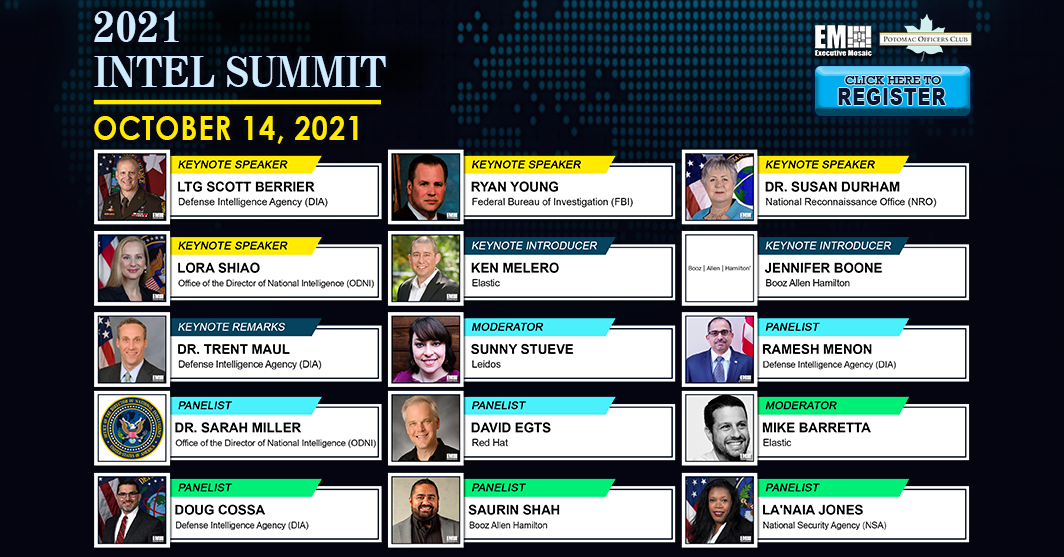Potomac Officers Club hosted its 7th Annual Intel Summit on Thursday to foster discussion between distinguished government and industry leaders on the current priorities, threats and strategies across the constantly evolving intelligence community landscape.
After a keynote address delivered by DIA Director LTG Scott Berrier, the moderator for the Summit’s Mission Software: AI/ML panel, Sunny Stueve, UX Lead Architect for Artificial Intelligence at Leidos, introduced the panelists and launched into a conversation focused on the advantages, obstacles and opportunities posed by AI as the technology continues to gain ground in national security.
If you missed the enlightening AI/ML panelist discussion, check out PotomacOfficersClub.com, where you can watch the full 7th Annual Intel Summit and other events on-demand.


In her introduction, Stueve highlighted the urgency behind federal agencies’ AI adoption plans, and said, “The race to develop faster and more sophisticated applications is accelerating as AI and ML techniques continue to mature for the defense and intelligence communities.”
To kick off the panel discussion, Dr. Sarah Miller, artificial intelligence/machine learning chief scientist for the Office of the Director of National Intelligence, shared that one significant hurdle of AI is that it is difficult to truly define because “we are still collectively coming to a wholesome understanding of what intelligence can and should mean for humans or anything else for that matter.”
She further explained that as AI continues to evolve, her work in particular with ODNI focuses primarily on leveraging automation, augmentation and AI (AAA) as well as machine learning to develop tools that will help federal agencies “understand the mountain of data generated across the world to better inform intelligence products and better equip decision makers.”
Additionally, Dr. Miller said the future challenges in AI adoption will not only be mature adoption, but secure, responsible and ethical adoption that can help IC agencies strike the right balance of trust and technological progress.
Next to take the virtual stage was DIA’s chief technology officer, Ramesh Menon, who provided a breakdown of AI into two basic elements of training and inference. The CTO stated that true AI innovation comes from the second element’s factor of learning from collected data.
“The question is how do we seamlessly integrate the data and the inferences from this data into our missions and obligations?” Menon asked.
Menon also utilized his private sector experience and expertise to shed light on how federal agencies can accelerate AI adoption, thereby advancing the increasingly essential modernization required by the current technological landscape.
He noted that the IC should consider working to streamline federal government processes and talent recruitment in order to match the speed of change across industry developments. “Our procurement process can be a little bit simpler to support the speed and scale of innovation,” Menon explained.
Red Hat public sector Chief Technologist, David Egts, who also served as the keynote introducer and Q&A moderator, was the final panelist to be introduced.
Part of Egts’ panel discussion honed in on the ethics of AI adoption and the obstacle posed by the wide spectrum of different AI maturity levels across countries, agencies and companies. Egts noted that across this broad spectrum, “Not only do the definitions [of AI technology] vary, but how people apply ethics to the technology is also different.”
Egts cited the use of facial recognition technology in law enforcement as a program of concern in regards to how that technology is used throughout agencies and organizations with differing AI/ML capabilities and maturities.
Finally, Egts shared that education can help pave the way for getting the “magic of AI from the lab coats to the operators in the field.” By bolstering STEM education on a national level and making AI a required component not only in computer science but in general studies as well, federal agencies will be better able to close the talent gap and smooth out the transition to AI-enabled technologies.
To hear the full Mission Software – AI/ML expert panel, visit PotomacOfficersClub.com, where you can watch the full 7th Annual Intel Summit on-demand now.


Potomac Officers Club’s next virtual seminar will be its Winning With the Network: Securing Data in Motion to the Tactical Edge Forum on October 27th, which joins together government and industry leaders to discuss how DoD and its commercial partners are leveraging advanced technology such as 5G, edge connectivity and AI to build more secure and robust networks.
Speakers such as BG Jeth Ray from the Army Futures Command, Maj. Gen. Michael Smith of the U.S. Air Force and Booz Allen Hamilton’s Khalid Syed will foster insightful discussions on how improving federal agency network capabilities will secure the nation against electronic warfare and cyber attacks.
Visit PotomacOfficersClub.com to register for the platform’s next JADC2 Series event, Winning With the Network: Securing Data in Motion to the Tactical Edge Forum on October 27th.





